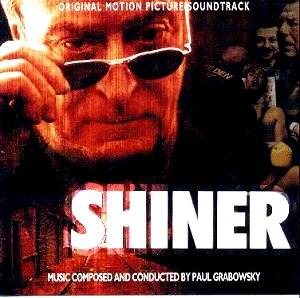************************************************************** EDITOR’s Recommendation October 2001 **************************************************************
Paul GRABOWSKY Shiner
OST
DECCA 470 183-2 [49:26]
Crotchet
A film about the world of professional boxing might not seem the most likely place to find a top-notch jazz score. Australian composer Grabowski and director John Irvin share a passion for jazz however, and it was no surprise to note in the booklet a mention of intentionally paying homage to Miles Davis. In several places, the album referenced Davisí style circa the classic In A Silent Way album. The wah-wah trumpet parts are highly prominent, especially in something like "The Fight" which is a cue in many ways at the heart of the album. This 6-minute tour de force features all of the scoreís strong points. Starting with a string adagio it diverts into a sort of South American bongo rhythm with claps and rumbling brass, then the jazz trumpet. It is a breathlessly exceptional piece.
Buried in this and many other cues is a melancholy motif for Michael Caineís character (whose nickname is the filmís title). We hear it in the opening title cue and later in "Shiner Comes Home" from someone whistling. Itís an engaging way to open the album, playing off the unpredictable nature of how a whistle will interact with the building jazz ensemble underneath. The first 3 cues are merged together in fact, making for a great 6-minute introduction of what to expect. Double bass, whistle, piano, small stings ensemble, drums, harp carry the nice and easy melody. Then "Backseat Driver" couldnít be more different from that of the same name on David Arnoldís Tomorrow Never Dies, with an old style funkiness thatís miles (Davis!) away from drum 'ní bass.
There is a counterpoint to this in the form of contributions from solo boyís voice in "Butterflies" and "Life and Death". Elsewhere all his mates at The London Oratory School join in as well.
Itís all surprisingly cohesive regardless of all these elements. Anyone who enjoys what Miles Davis did, what Mark Isham or Lalo Schifrin does, or what Carter Burwell did with Conspiracy Theory will get a huge kick out of this album.
Paul Tonks
Return to Index
